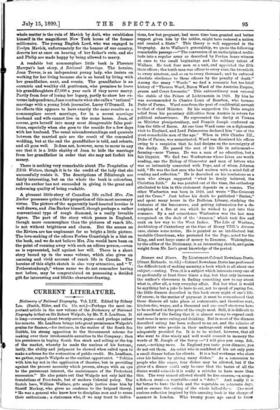CURRENT LITERATURE.
Dictionary of National Biography. Vol. LIX. Edited by Sidney Lee. (Smith, Elder, and Co. 15s. net.)—Perhaps the most im- portant article in the new volume of the Dictionary of National Biography is that on Sir Robert Walpole, by Mr. T. S. Leadham. It is long—covering about twenty-seven pages—and perhaps rather too minute. Mr. Leadham brings into great prominence Walpole's genius for finance,—for instance, in the matter of the South Sea Bubble, his strong opposition to the Government scheme for making over their irredeemable annuities to the Company ; then his prescience in buying South Sea stock and selling at the top of the market, whereby he made the nucleus of his fortune; lastly, the ability and judgment he showed when called upon to make a scheme for the restoration of public credit. Mr. Leadham, we gather, regards Walpole as the earliest opportunist. "Politics with him lay not in the application of theories, but in providing against the present necessity which presses, always with an eye to the paramount interest, the maintenance of the Protestant succession." He also points out that Walpole not only laid the foundations of Free-trade, but of modern Colonial policy. The Scotch hero, William Wallace, gets ample justice done him by Sheriff Mackay, who gives no credence to the brigand theory. "He was a general who knew how to discipline men and to rouse their enthusiasm ; a statesman who, if we may trust to indica- tions, few but pregnant, had more time been granted and better support given him by the nobles, might have restored a nation and created a State." This theory is well supported in the biography. As to Wallace's generalship, we quote the following remarkable passage :—" The conversion of an undisciplined multi- tude into a regular army as described by Fordun bears witness at once to the small beginnings and the military talent of Wallace. He took four men as a unit, and appointed the fifth their officer; the tenth man was officer to every nine, the twentieth to every nineteen, and so on to every thousand ; and be enforced absolute obedience to those officers by the penalty of death." Among the many " Wards " we find a romantic but too brief history of "Thomas Ward, Baron Ward of the Austrian Empire, groom and Court favourite." This extraordinary man entered the stable of the Prince of Lichtenstein in 1823. By him he was recommended to Charles Louis of Bourbon, who became Duke of Parma. Ward rose from the post of confidential servant to that of chief Minister. By his suggestion the Duke sought relief from his pecuniary difficulties from Austria in return for political subservience. He represented the duchy at Vienna as Minister plenipotentiary, and Francis Joseph conferred on him the title of Baron. At one time Ward came on a diplomatic visit to England, and Lord Palmerston declared him "one of the rrost remarkable men of the age." When in 1854 Charles III., Duke of Parma, was assassinated, Ward was dismissed his offices owing to a suspicion that he had designs on the sovereignty of the duchy. He passed the rest of his life in retirement- farming—near Vienna. He was a man of no education, but a fair linguist. We find two NV arburtons whose Lives are worth reading, one the Bishop of Gloucester and man of letters who was so intimately connected with Pope, and of whom Johnson said, "He was the last man who had written with a mind full of reading and reflection." He is described on his tombstone as a man who always supported "what he firmly believed, the Christian faith." As was pointed out at the time, the orthodoxy attributed to him in this statement depends on a comma. The other Warburton was born in 1810, and wrote "The Crescent and the Cross." Just before his death he published "Darien," and spent many hours in the Bodleian Library, studying the histories of the buccaneers, and getting information for a de- scription of a fire at sea which he wished to put into this romance. By a sad coincidence Warburton was the last man recognised on the deck of the 'Amazon,' -which took fire and sunk on her way to the West Indies. The Life of Warham, Archbishop of Canterbury at the time of Henry VIII.'s divorce case, claims some notice. He is painted as an intellectual but unstable Churchman, who protested for the Pope, acted for the King, and sent large sums of money to Erasmus. Walsingham, by the editor of the Dictionary, is an interesting sketch, and gains weight from Mr. Lee's great knowledge of the period.






































 Previous page
Previous page